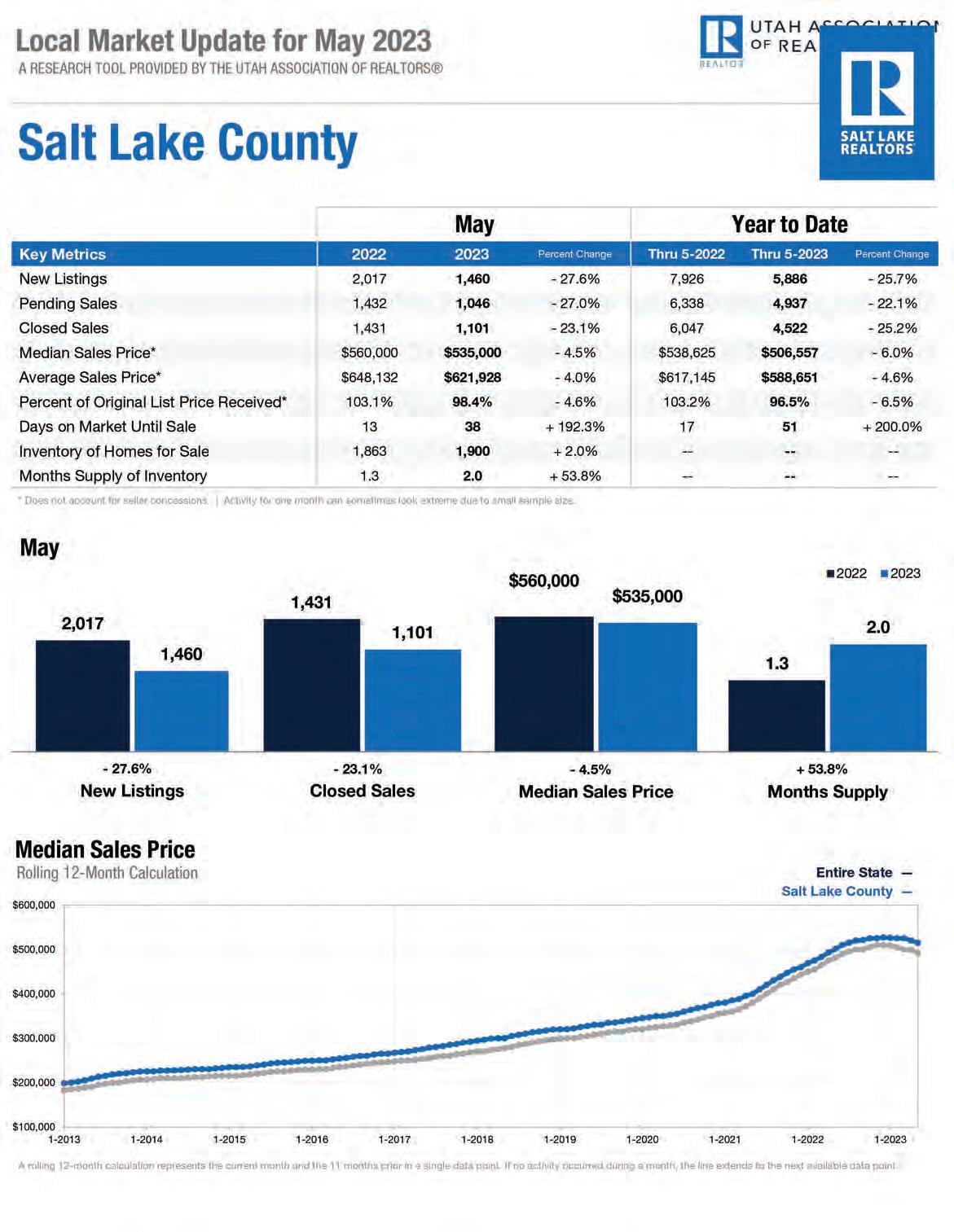
5 minute read
HOUSING WATCH
Salt Lake Home Prices Down from a Year Ago, But Up 11% from December 2022
Rising interest rates have contributed to a dampening effect on home sales in Salt Lake County. With a total of 1,101 units changing hands in May, there was a notable decline of 23% compared to the 1,431 sales recorded in May 2022.
More than two-thirds (73%) of all homes sold in Salt Lake County in May were single-family homes. Twenty-six percent of sales were multi-family units (condominiums, townhomes, twin homes). The remaining 1% of sales were recreational and mobile homes.
In the past year, since the Federal Reserve began increasing interest rates, there has been an average monthly decrease of approximately 450 home sales in Salt Lake County. Additionally, the median sold price of all housing types in May dropped to $535,000, representing a 5% decrease from the previous year’s value of $560,000.
The decline in Salt Lake home prices commenced last summer, coinciding with the Federal Reserve’s decision to raise short-term interest rates. Starting from $560,000 (all housing types) in May 2022, median prices gradually decreased to $480,000 by December 2022.
However, there has been a rebound in home prices since December to May of this year, with an overall increase of 11%. As of June 22, the 30-year fixed-rate mortgage averaged 6.67%, higher than the 5.81% rate seen a year ago, as reported by Freddie Mac.
The days on market until sale in Salt Lake County increased to 38 days in May, up from 13 days in May 2022. Housing inventory levels increased to 2.0 months in May, up from 1.3 month a year earlier.
Nationally, total existing-home sales – completed transactions that include single-family homes, townhomes, condominiums, and co-ops – rose 0.2% from April to a seasonally adjusted annual rate of 4.30 million in May. Yearover-year, sales dropped 20.4% (down from 5.40 million in May 2022).
“Mortgage rates heavily influence the direction of home sales,” said NAR Chief Economist Lawrence Yun. “Relatively steady rates have led to several consecutive months of consistent home sales.” them need a minimum amount of information. That includes:
First-time buyers were responsible for 28% of sales in May, down from 29% in April but up from 27% in May 2022. NAR’s 2022 Profile of Home Buyers and Sellers – released in November 20224 – found that the annual share of firsttime buyers was 26%, the lowest since NAR began tracking the data.

• The person’s name
• Contact information
• What property they contacted you about (or where they came from if it wasn’t from a property)
• Their timeframe is for moving
• If they’re buying, selling, or both
• If they’re buying, what they’re looking for and in what area
• Their emotional hot buttons (what they get excited or angry about)
If you don’t have all of the information you need, don’t be afraid to contact them again for more information. And once you have the information you need, continue to contact them on a regular basis to make sure they stay on track. Don’t worry that you’ll be bothering them—instead, worry that they would otherwise forget who you are or feel ignored by you.
Skill 4: Asking for What You Want
This is typically a big problem with real estate rookies, but you’d be surprised how many veterans forget this piece of the puzzle, too. It’s not always easy, but you have to ask for things to get them. Ask for the sale. Ask for the appointment. Ask for the phone number of the person your client wants to refer.
Don’t wait for people to call you, for the clients to say they’re ready, or for the buyers to tell you that this is the house they want. Be direct. Ask them, “Is this the house you want to buy?” “I’ll get your house on the market tomorrow if you’ll sign right here.” “Which is better for you: Monday at 6 p.m. or Wednesday at 3 p.m.?” “Why don’t you give me your friend’s number, and then you don’t have to think about it anymore?” All of these are great closing questions used by some of the top practitioners in the industry.
Skill 5: Setting Appropriate Expectations
Once you have the contracts signed and your clients are committed to the process, then it’s all about meeting expectations. And make no mistake, there will be expectations—whether you set them or your clients do. This is why it’s important to set those expectations yourself; you don’t want to get blindsided by something the clients decided to expect without consulting you.
The best real estate professionals are masters at setting expectations. They know what reasonable timeframes are, and they don’t make promises they can’t keep. They let clients know immediately if things need to change, and they set the new expectations quickly and decisively, leaving no room for the clients to wonder (and worry) what happens next.
Skill 6: Taking Care of Details
You must treat your business like a business. This means having a system in place to make sure deadlines get met, appraisals are ordered, home inspection responses come in on time, appointments aren’t forgotten, and problems are solved. You should even have systems to make sure that your clients—and, if you’re really smart, the other side’s clients—have handled all of the details they need to attend to. Hold on to every deal and work it until it closes, letting nothing go. In saving multiple deals from certain death each year, top performers improve their closing ratios and increase their per-hour earnings.
Skill 7: Paying Close Attention to Money
Lots of agents tell me that it’s not about the money for them; it’s about the people. And that’s great. I love helping people, too. But if you don’t focus on making money, you’re not going to make any. Real estate is your business, your livelihood, and you deserve to be compensated for the skills and services you provide. If you stop paying attention to the money, you’ll do things like:
• Negotiate away your commission.
• Not take a referral fee “to be nice.”
• Work on listings that will never pay you anything close to reasonable compensation for the amount of work you do because you “feel bad for the person.”
• Take overpriced listings so that the sellers will like you.
• Not make buyers sign contracts.
• Stay with a broker who pays you a below-market split.
All of these things result in you working too hard and not making what you deserve. It’s not your job to right the wrongs of the world. It’s your job to make a living for yourself, preferably a really good one. It’s not about the number of deals you do; it’s about how much money you get to keep when the deals are done.
You have to focus on the money if you hope to be successful. If you’re not making a profit, you’re running a charity, not a business, and you don’t get grants like charities do to make ends meet.
You have to keep up with changes in technology, industry regulations, buyer and seller priorities, and economic conditions. But the skills that I’ve listed above will take you further than any new flashy marketing plan or social media technique. No matter what’s going on in real estate, these skills will be the difference between a good agent and a great one.
Reprinted from Realtor® Magazine Online, June 2023, with permission of the National Association of Realtors®. Copyright 2023. All rights reserved.










